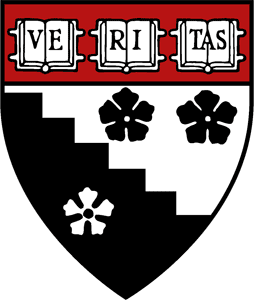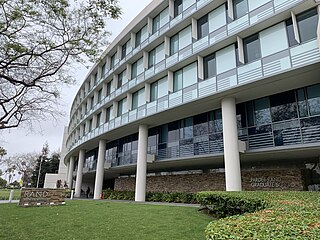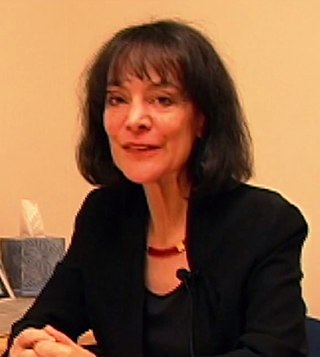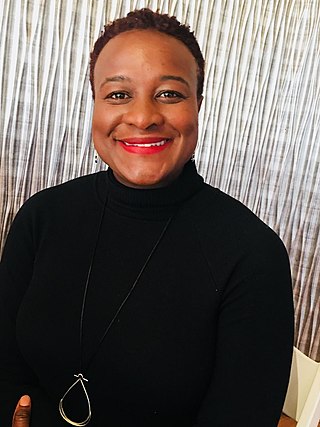The UCLA School of Education and Information Studies is one of the academic and professional schools at the University of California, Los Angeles. Located in Los Angeles, California, the school combines two distinguished departments whose research and doctoral training programs are committed to expanding the range of knowledge in education, information science, and associated disciplines. Established in 1881, the school is the oldest unit at UCLA, having been founded as a normal school prior to the establishment of the university. It was incorporated into the University of California in 1919.

The Harvard Graduate School of Education (HGSE) is the education school of Harvard University, a private research university in Cambridge, Massachusetts. Founded in 1920, it was the first school to grant the EdD degree and the first Harvard school to award degrees to women. HGSE enrolls more than 800 students in its one-year master of education (Ed.M.) and three-year doctor of education leadership (Ed.L.D.) programs.

Claude Mason Steele is a social psychologist and emeritus professor at Stanford University, where he is the I. James Quillen Endowed Dean, Emeritus at the Stanford University Graduate School of Education, and Lucie Stern Professor in the Social Sciences, Emeritus.
Stephen Michael Kosslyn is an American psychologist and neuroscientist. Kosslyn is best known for his work on visual cognition and the science of learning. Kosslyn currently serves as the president of Active Learning Sciences Inc., which helps institutions design active-learning based courses and educational programs. He is also the founder and chief academic officer of Foundry College, an online two-year college.

The Frederick S. Pardee RAND Graduate School is a private graduate school associated with the RAND Corporation in Santa Monica, California. The school offers doctoral studies in policy analysis and practical experience working on RAND research projects to solve current public policy problems. Its campus is co-located with the RAND Corporation and most of the faculty is drawn from the 950 researchers at RAND. The 2018–19 student body includes 116 men and women from 26 countries around the world.
Linda Darling-Hammond is an American academic who is the Charles E. Ducommun Professor of Education Emeritus at the Stanford Graduate School of Education. She was also the President and CEO of the Learning Policy Institute. She is author or editor of more than 25 books and more than 500 articles on education policy and practice. Her work focuses on school restructuring, teacher education, and educational equity. She was education advisor to Barack Obama's 2008 presidential campaign and was reportedly among candidates for United States Secretary of Education in the Obama administration.
Andrew Calvin "Andy" Porter, Ph.D. is the former Dean of the University of Pennsylvania Graduate School of Education and also serves as Penn GSE's George and Diane Weiss Professor of Education. Porter is an educational psychologist and psychometrician who has made significant contributions to education policy and has published widely on educational assessment and accountability, teacher decisions on content and how curriculum policy effects those decisions, opportunities for students to learn and achievement indicators, measuring content and standards alignment, teacher professional development, educational research methodology, and leadership assessment. Porter's current work centers on the VAL-ED project, a research-based evaluation tool that measures the effectiveness of school leaders by providing a detailed assessment of a principal's performance funded by the US Department of Education/IES. Porter also works on two projects funded by the National Science Foundation that focus on the effects of teacher professional development on improving teaching and learning.

Carol Susan Dweck is an American psychologist. She is the Lewis and Virginia Eaton Professor of Psychology at Stanford University. Dweck is known for her work on motivation and mindset. She was on the faculty at Columbia University, Harvard University, and the University of Illinois before joining the Stanford University faculty in 2004. She is a Fellow of the Association for Psychological Science.
The University of Pennsylvania Graduate School of Education, commonly known as Penn GSE, is an Ivy League top-ranked educational research school in the United States. Formally established as a department in 1893 and a school at the University of Pennsylvania in 1914, Penn GSE has historically had research strengths in teaching and learning, the cultural contexts of education, language education, quantitative research methods, and practitioner inquiry. Pam Grossman is the current dean of Penn GSE; she succeeded Andrew C. Porter in 2015.
Ellen Markman is Lewis M. Terman Professor of Psychology at Stanford University. She specializes in word learning and language development in children, focusing specifically on how children come to associate words with their meanings. Markman contends that in order to learn the meaning of a word, children make use of three basic principles: the whole object assumption, the taxonomic assumption, and the mutual exclusivity assumption. Related topics that Markman has studied include categorization and inductive reasoning in children and infants. Markman subscribes to the innatist school of developmental psychologists, which asserts that children possess innate knowledge that they draw upon in the process of language acquisition.
Susan Harriet Fuhrman is an American education policy scholar and served from 2006 as the first female president of Teachers College, Columbia University. Fuhrman earned her doctorate in Political Science and Education from Columbia University. She became very engaged in issues of educational equity and emerged as an authority on school reform. Fuhrman is known for her early and ongoing critical analysis of the standards movement and for her efforts to foster research that provides a scientific basis for effective teaching.

Maryanne Wolf is a scholar, teacher, and advocate for children and literacy around the world. She is the UCLA Professor-in-Residence of Education, Director of the UCLA Center for Dyslexia, Diverse Learners, and Social Justice, and the Chapman University Presidential Fellow (2018-2022). She is also the former John DiBiaggio Professor of Citizenship and Public Service, Director of the Center for Reading and Language Research, and Professor in the Eliot-Pearson Department of Child Study and Human Development at Tufts University. She is a permanent academician in the Pontifical Academy of Science. She was recently made an Honorary Advisory Fellow on the United Sigma Intelligence Association.

Jo Boaler is a British education author and Nomellini-Olivier Professor of Mathematics Education at the Stanford Graduate School of Education. Boaler is involved in promoting reform mathematics and equitable mathematics classrooms. She is the co-founder and faculty director of youcubed a Stanford centre that offers free mathematics education resources to teachers, students and parents. She is the author of nine books, including Limitless Mind (2019), Mathematical Mindsets (2016), What's Math Got To Do With It? (2009) and The Elephant in the Classroom (2010), all written for teachers and parents with the goal of improving mathematics education in both the US and UK.

Edith K. Ackermann was a Swiss-born American psychologist who explored the interactions between developmental psychology, play, learning and design. A graduate of the University of Geneva, and a protege to Jean Piaget, she held permanent and visiting positions at several institutions in the United States and Europe, including the MIT Media Lab.

Marcelo Suárez-Orozco is the ninth permanent and current chancellor of the University of Massachusetts Boston, and is the first Latino to lead a campus in the Massachusetts public university system. He is the former inaugural UCLA Wasserman Dean at UCLA Graduate School of Education and Information Studies.

Prudence Carter is an American sociologist. She is a Sarah and Joseph Jr. Dowling Professor of Sociology at Brown University. She has been elected president of the American Sociological Association with effect from 2023.
Vivian Lynette Gadsden is an American psychologist who is an education researcher at the University of Pennsylvania. Her research considers the social and cultural factors that affect learning and literacy. She is interested in intergenerational learning within African-American families.
Na'ilah Suad Nasir is an educational researcher and the sixth president of the Spencer Foundation. She was president of the American Educational Research Association in 2021-22. Previously she held several named professorships, including the Birgeneau Chair in Educational Disparities and the H. Michael and Jeanne Williams Chair of African-American Studies at UC Berkeley, where she also served as the vice-chancellor of equity and inclusion. She has also taught as a faculty member at the Stanford Graduate School of Education.

The Stanford University Graduate School of Education is one of the top education schools in the United States. It offers master's and doctoral programs in more than 25 areas of specialization, along with joint degrees with other programs at Stanford University including business, law, and public policy. The current dean of Stanford GSE is Daniel L. Schwartz.










